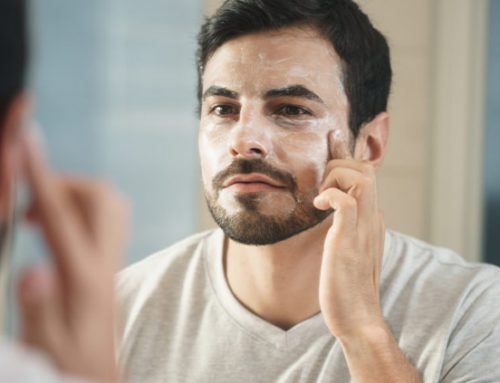What if there was a product—a cream, say—that you could put on your face that could dramatically slow the signs of aging? Something that was proven to work in study after study. How far would you travel to get it? How much would you be willing to spend?
Well, you probably won’t have to go very far or even spend that much money, because this incredible product is right under your nose: it’s sunscreen.
We are pretty diligent about putting sunscreen on ourselves and our kids when we go to the beach, but few of us use it daily as we should. Why is that? It could be a lack of understanding, or maybe it’s because it just feels so gunky, and it ruins the way our makeup looks.
Both of these problems have solutions. First, let’s talk about the facts, and then let’s look at how to choose the best sunscreen for you (and your makeup).
The Facts About Sun Exposure and Sunscreen
The sun emits two kinds of ultraviolet (UV) radiation that can be harmful with overexposure: ultraviolet A (UVA) and ultraviolet B (UVB).
- UVA rays cause premature aging in the form of wrinkles and age spots.
- UVB rays are the main cause of sunburn.
It is important to note here that tanning beds also emit UV radiation and should be used cautiously.
UV exposure is not just about beauty: it can also cause painful sunburns and increase your risk of getting skin cancer. The United States Surgeon General called skin cancer “a major public health problem” in an October (2016) Call to Action, and recommended the use of sunscreen for prevention.
Sunscreens use a variety of chemicals and minerals to block exposure to UVA and/or UVB rays. There are two main kinds of sunscreen:
- Chemical sunscreens, like oxybenzone and avobenzone, absorb UV rays before they reach cells and cause damage.
- Physical (also called mineral) sunscreens like, zinc oxide and titanium dioxide, protect us by reflecting UV rays. You may recognize the old name for physical sunscreens: sunblocks.
Sunscreens are also rated for their ability to protect you from the sun’s rays using a numbered SPF system. SPF stands for Sun Protection Factor and only applies to UVB rays. While no sunscreen can block 100% of UVB rays, an SPF of just 15 can block 93% of them.
To get the most benefit from your sunscreen, The American Academy of Dermatology has the following recommendations:
- It should have an SPF rating of 30 or higher.
- It should be Broad Spectrum, which means it protects from both UVA and UVB rays.
- It should be water resistant.
The way you apply sunscreen is also important. For that we recommend you check out this video by the American Academy of Dermatology:
How to Choose the Right Sunscreen for You
There are hundreds of sunscreens on the market to choose from, and while this can be a bit overwhelming, it also means that you are likely to find one that works for you and your lifestyle. Remember, expensive doesn’t always mean better.
First, think about your skin type. If you have oily skin, there are lots of sunscreens that are oil free. If your skin is dry, many are made with a whole host of carrier oils, some of which absorb faster than others. You can also combine two sunscreens: one for your oilier T-zone and another for the rest of your face.
If you have sensitive skin, you’ll probably do well with one of the physical or mineral sunscreens. Many come without added fragrance or other irritants and may even be labeled as a children’s product.
Sunscreens come in different forms like creams, lotions, sprays, or aerosols. Creams often take longer to soak in, while sprays and aerosols should be used with your eyes and mouth securely closed.
Some women (and men for that matter) complain that sunscreen can cause their makeup to fade quickly or look bad. Here are some tips if this is the case for you:
- Massage your sunscreen in well and give it enough time to soak in.
- Use a powdered mineral foundation.
- Use a translucent powder to help set your make-up and provide touch-ups during the day.
With a bit of trial and error you can find a sunscreen that is most compatible with your favorite brand of makeup. If you want a shortcut here, check out the articles on the best sunscreens to wear under makeup here and here.
Whichever sunscreen you choose, the important thing is to wear it every day, even in the winter and when it is cloudy outside. If you want to find out more about keeping your skin healthy and youthful, schedule a consultation with Dr. Slack today.





